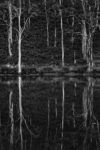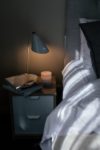Steven noticed his father’s slight limp as they took the trail into the woods next to the house. He glanced at his brother, to see if he had noticed, but Paul was looking at the trees and the ferns growing beneath. “It’s all different now,” he said.
“I keep trimming back the undergrowth,” Father said.
“It was all wild when we were kids,” Paul said. “It’s almost like a park now.”
“Everything is civilized and regulated now,” Steven said, more bitterly than he meant. He remembered endless days of exploring and adventuring in these woods, where one might get lost and find treasure and meet spirits. Now, with the tall, straight trees, the cleared brush, and his father’s worn paths, those memories were tinged with a sharp sense of loss.
“I found something while poking around back here,” Father said. “I’d forgotten all about it. It’s in the southwest corner, past that big oak that came down in the storm. You remember?”
Steven remembered. He had been thirteen, old enough to fake that thunderstorms didn’t frighten him, even though he was awake half the night as the house shook and the wind banged against the windows and lightning blasted the darkness.
“I thought the world was ending, and Christ was coming back,” Paul laughed. He had whimpered in his bed, the bottom bunk, and Steven had told him to shut up and stop being a baby.
They walked for ten minutes, the sun fitfully showing itself. It was an early Easter, so the weather was still cold, even when the clouds cleared for twenty minutes at a time. The old fence, just leaning posts and a few strung-along wires, still straggled along the western edge of the property. The newly blazed trail, grass still growing between the ATV tracks, ran along the fence.
Father led them into a clearing Steven didn’t remember. The remains of a few narrow stumps showed it had been recently cleared. Father had hauled an old wooden bench back. The area was shadowed by the branches overhead, and gray clouds had swept in front of the sun. A large stone, set upright, stood near the center.
“I remember climbing that,” Paul said. “It was my ship or island or something. Sometimes we couldn’t find it. It was always tricky finding anything back here. It was full of brambles.”
“We just had a lousy sense of direction.” Steven had a vague recollection of the rock. There had been poison ivy nearby, too, he thought. That’s probably why he hadn’t ventured much in this area.
“I was going through some of Grandpa’s stuff,” Father said, “and something in that reminded me of this. Your great-great-grandpa set this up a long time ago.”
“He lived across the south property line, right?” Steven said. The land there had been sold off a generation ago, and three houses stood there now.
Father nodded. “Before that, something important happened here. Your great-great-grandfather was a hard man from a hard family. I used to know the details. Drinking and fights and stuff like that. It’s written somewhere. Here, at this place, is where he met God. That’s what he said.”
“What do you mean, met God?” Steven asked.
“Met him, knew him truly. We’ve all had some moment when he became real, not just stuff people told us. To your great-great-grandpa, this was a holy place.”
Steven looked at the rock and at his father looking at the rock, and he felt nothing.
“I was in a hotel room in Atlanta at a conference,” Paul said quietly. “Alli was at home with Georgia. She’d just been born. And I was–well, I was angry and feeling sorry for myself, and I started reading one of those Bibles in the drawers, because I remembered all those years you took us to church and prayed with us. Some time along the way I just sorta….” Paul smiled. He always smiled, eventually, no matter what happened. “I forgot it all until then. It was like a slap in the face.”
“I remember,” Father said.
“Steven, here, he’s always had it figured out.” Paul laughed again.
Steven was an elder at his church and had been for a decade, and he knew the Bible as well as the pastor. He lived a good life, a clean life.
“It started with your great-great-grandfather,” Father said. “That’s when the faith in this family started. Right here, in this little piece of woods. I think about that sometimes when I sit here.”
“It’s not magic, Dad,” Steven said.
“No, it’s not. But it’s a real place, a solid fact. Once, God spoke to a cussing, drunk rascal, and it changed his life. It changed mine. And yours.”
“Once, this forest was filled with pirates and goblins and wizards, too,” Paul joked.
“That, too,” Father said, eying them. “But if God can act once, he can act again. I need to know that. I thought you might find that interesting. Well, your mom will want us back before the rain starts.”
“It’s pretty neat, Dad,” Steven said, as they walked back. The sun was showing itself briefly between the dark clouds.
“I thought so,” Father said, looking at Steven. “I thought so.”






Recent Comments